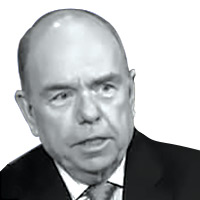Two events this past week, one the object of saturation coverage, the other modestly noted in muted terms, signal the emergence of a new political landscape. Barack Obama is changing America—and so will Michael Bloomberg. And in impact and effect they will do it together.

In the State of the Union message, the president called for bold measures ranging from job creation to immigration reform to gun regulation, while offering this reassurance: "It is not a bigger government we need, but a smarter government that ... invests in broad-based growth." The formulation was less an echo of the triangulating, Dick Morris—heeding Bill Clinton of 1996—"The era of big government is over"—than a paraphrase of John F. Kennedy as he pushed for Medicare and a vast expansion in federal aid to education. "I don't believe in big government, but in effective governmental action."
Obama is proving to be both shrewd and resolute as he realigns American politics – first in the 2012 campaign, then in his inaugural address, and now in his State of the Union vision of a "government that works for the many, not the few." This was anything but triangulation—and even before he mounted the rostrum to deliver it, the speech drew a rebuke from my friend and the conservative Republican strategist Alex Castellanos. Obama, he wrote, is leading Democrats to "the end of an ideological limb." They'll lose because he's a "liberal" and his party is following him into the wilderness of "liberalism"—as if that word still constituted the lethal epithet brandished by the GOP across a generation.
But the Reagan era is over—although in fairness, I should add that the immigration-reforming, Social Security–saving, thrice tax-raising Ronald Reagan was far more pragmatic than today's Republicans, trapped in their own rigidity or in a rigor mortis of fear about facing primaries from the far right. In fact, the polling shows that on virtually every issue—and on the big questions of economic justice, investment for growth, and equal rights—Americans agree, usually by wide margins, with the president's agenda.
As the debate is joined, in this Congress and on the mid–term campaign trail, New York Mayor Michael Bloomberg has a critical, perhaps indispensable, role to play.
In terms of Obama's larger argument about activist government, Bloomberg has impressively validated the worth of public endeavor—in reviving lower Manhattan, in reforming the city school system, in reducing smoking, and in making New York arguably the safest big city in America. There is justifiable controversy about some of his policies, particularly stop-and-frisk, which primarily ensnares minorities; but there is no doubt that at the end of the year he will finish his term as a living rebuke to the reactionary cliché that government is inherently wasteful, counterproductive, barren.
But what matters more in the contentious days and months ahead is that while he's leaving office, he's plainly not leaving public life. As Obama was standing before Congress, Bloomberg, with the full force of his super PAC, was in the arena hundreds of miles away standing up for his long-term priority—and now Obama's-—gun controls that won't stop all the shootings, but can stop America from being a free-fire zone.
In the special election in a Chicago congressional district to choose a successor to Jesse Jackson, Jr., the Bloomberg super PAC has just exceeded the million-dollar mark in ads holding the one-time front–runner Debbie Halvorson to account for her A+ rating from the National Rifle Association. As the latest ad puts it, she would put "more guns in the hands of criminals." Halvorson has fallen behind in the Democratic primary that will determine who takes Jackson's place. The pollster for her principal opponent, who's suddenly in the lead, attributes the shift to "gun control"— and the credit for that goes to Bloomberg.
The mayor, worth approximately $25 billion, will spend heavily all the way to the Feb. 26 primary. He first sent his bankbook into this battle in 2012. One of his targets was a 71-year-old Democratic congressman from California, the NRA-blessed Joe Baca, who lost to his Democratic challenger. Obviously guided by survey research, the Bloomberg super PAC ran an ad highlighting Baca's dismal record of siding with polluters. (Link to national Journal, "Bloomberg super PAC gun-control push off to strong start," December 17, 2012, 8:35 AM) This was the lever to pry him from Congress. The gun guy was gone, but the gun issue wasn't the overt focus.
It was a mirror image of what the gun lobby, angered by the first, now-expired assault weapons ban, did to House Speaker Tom Foley in his half-rural eastern Washington district in 1994. The anti-Foley advertising concentrated on blasting him for his opposition to term limits—and he went down by handful of votes.
Sophisticated, well–financed to say the least, the Bloomberg campaign is only just getting started – and before it ends, it can upend long-settled assumptions about the political toxicity of gun-control. It will be far more consequential than the weird apparition of the gun–crazed rocker Ted Nugent at the State of the Union.
There is fertile ground here for Obama – and for a Bloomberg ad blitz. From outlawing the on–line sale of ammunition to background checks for private and gun show sales, the Pew poll finds majority, sometimes super-majority, support for eight tough new gun regulations. And a PPP survey finds that an NRA endorsement is now a net negative; by a healthy margin of 13 percent, people say it would make them "less likely" to vote for a candidate. PPP also reports that "the desire for stronger [gun] legislation has not died down as Newtown gradually fades from voters' minds."
As the president so powerfully said, "The families of Newtown deserve a vote" in Congress. And in that struggle and after, they're going to receive the kind of help from Michael Bloomberg that can counter the gun lobby's rich resource advantage—which has smothered other attempts to curb domestic weapons of mass destruction after other devastating massacres.
The Bloomberg super PAC can, and I believe it will, protect incumbents who dare to do the right thing. It can, and I believe it will, push non-incumbent candidates to stand up to the NRA – and go after vulnerable ones who don't.
The Bloomberg approach will be sophisticated, data–driven, and opportunistic – with a potentially decisive presence in closely divided districts and states. The promise of air cover and the threat of on-air attack can make a difference in Congress this year – and change Congress next year.
In effect, Bloomberg will assist Democrats as they seek to confound the mid–term odds and gain seats or even take back the House--although that's not his intention. Yes, the Bloomberg boom will be lowered on some Democrats too, most likely in primaries--and Republicans with the courage to resist NRA blandishments and blackmail will be aided if they're in trouble. But the bottom line is that there aren't very many of them. So as it out-guns the gun lobby, the super PAC's nonpartisan spending will yield a partisan advantage.
That, however, counts far less than the reach for a safer country with saner gun laws. The most moving part of the State of the Union was the President's appeal for an America where "birthdays, graduations, anniversaries ...[will no longer be] stolen from our lives by a bullet." And soon–to–be-former Mayor Bloomberg can be a moving force in spiking the cannons of the NRA. Instead of retiring from public life, he may reshape it and save the lives of thousands and ultimately tens of thousands. His greatest achievement, and his greatest contribution, may not be in City Hall.
Go, Mike, go.






